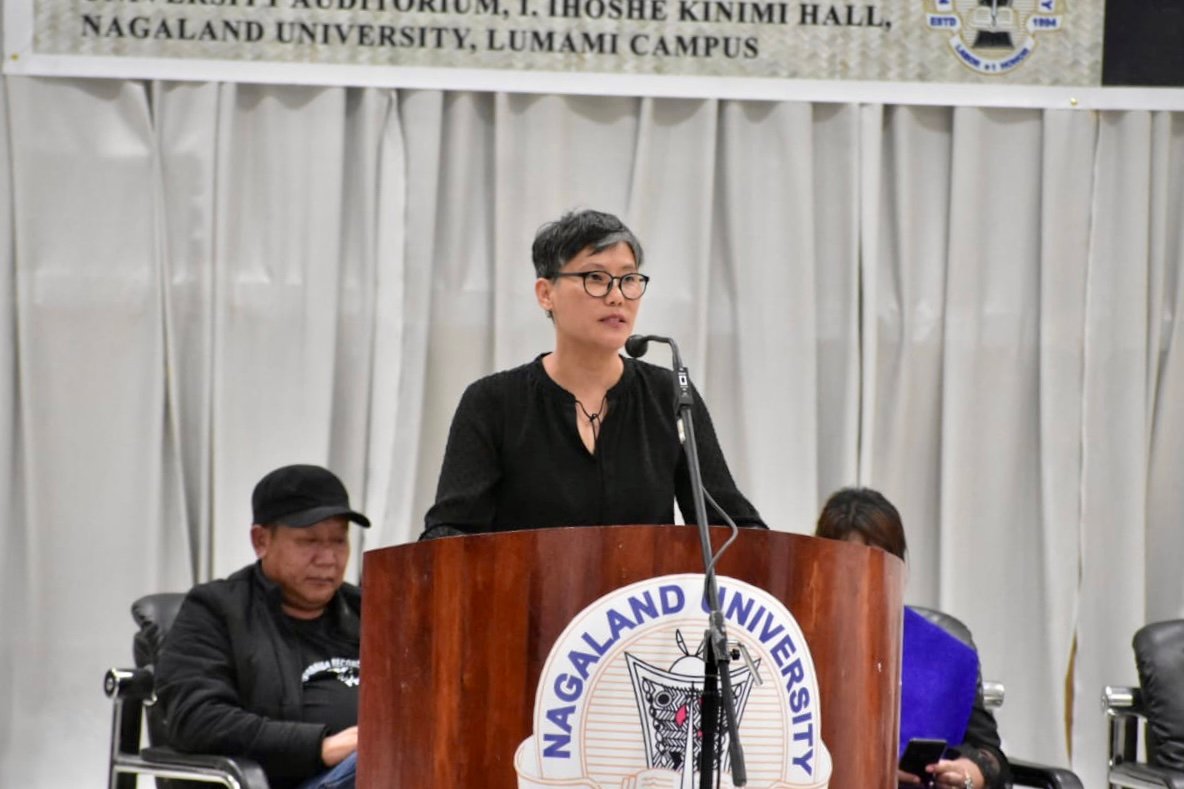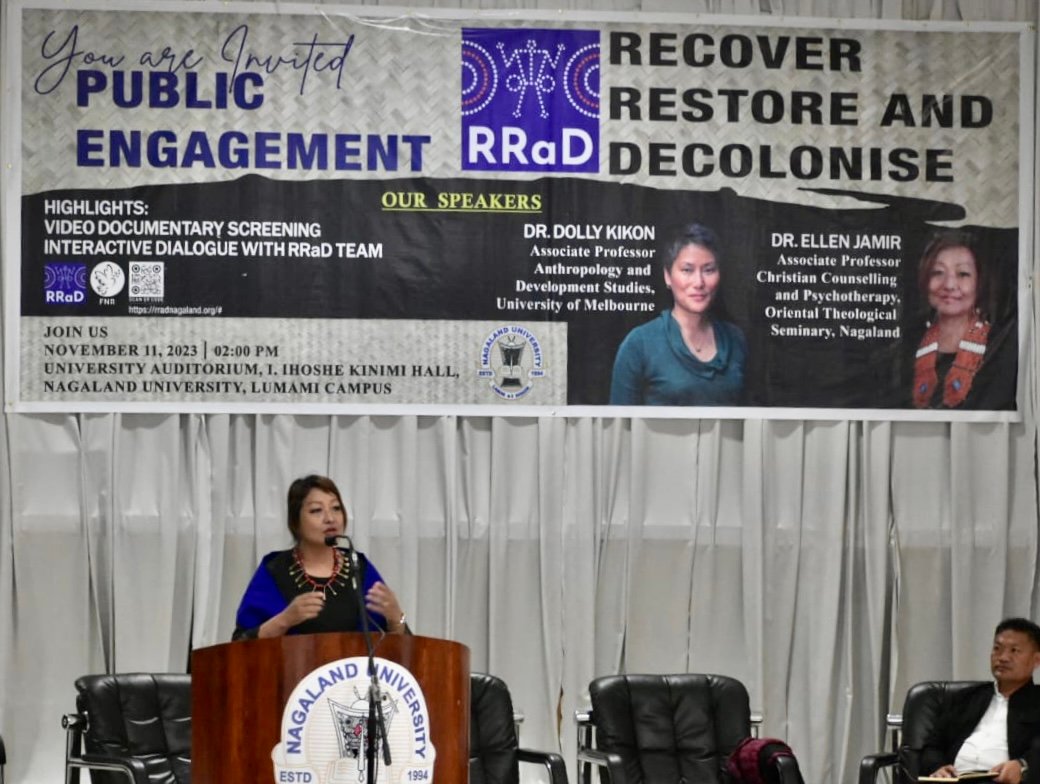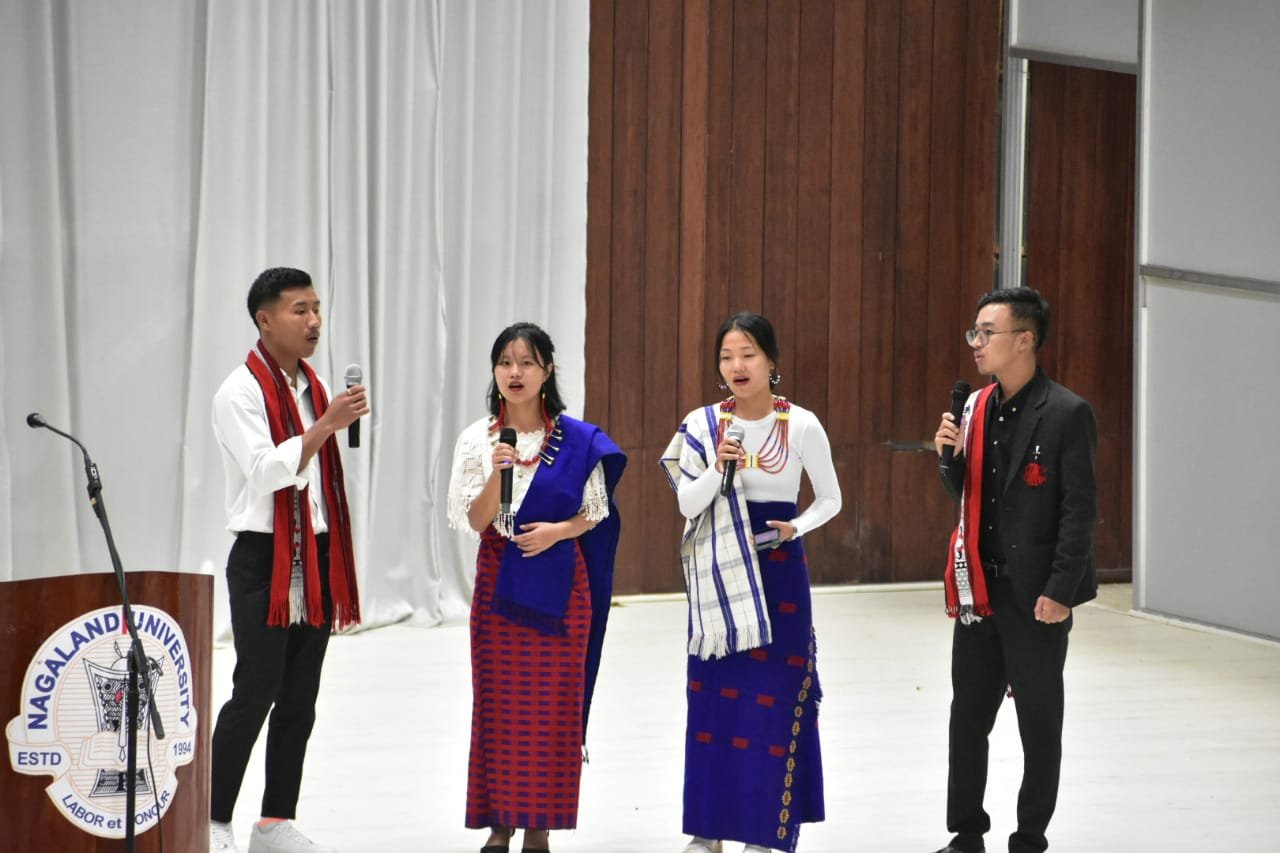A dialogue on the Repatriation of Naga Ancestral Human Remains by the Recover Restore and Decolonise (RRaD) Team was conducted on 11th November 2023 at Jubilee College Mokokchung and Nagaland University, Lumami. Dr Dolly Kikon, Associate Professor of Anthropology and Development Studies at the University of Melbourne, served as the speaker, while Dr Ellen Jamir, Associate Professor of Christian Counselling & Psychotherapy at Oriental Theological Seminary, Nagaland, moderated the event.
Dr Dolly Kikon, Associate Professor of Anthropology and Development Studies at the University of Melbourne, emphasized in her address that “Recover, Restore, and Decolonise” (RRaD) is integral to the Forum for Naga Reconciliation (FNR). The FNR comprises Naga researchers, students, social activists, human rights activists, and theologians dedicated to exploring “Repatriation.”
Download Nagaland Tribune app on Google Play

Dr Kikon revealed that the Pitt Rivers Museum at Oxford University houses approximately 6,466 Naga artifacts, making it the world’s largest Naga collection, including around 213 Naga human remains.

Addressing misconceptions, she clarified that the focus is not solely on the Naga warrior past but on the complexities of human remains in the Repatriation dialogue. She posed the question, “How do we recover our stories?” highlighting the need to reclaim misrepresented narratives.
Expanding on the “Recover” aspect, Dr Kikon discussed the connection between Mithun and the Nagas, emphasizing the importance of reclaiming past stories. She explained that “Restoring” involves reinstating dignity for Naga researchers, scholars, students, and thinkers in the global narrative.
Regarding “Decolonisation,” she acknowledged differing views within the Naga scholarly community but stressed its global relevance in the 21st century. Dr Kikon urged Naga scholars to internalize the urgency of engaging with decolonization in their work and questioned “why Naga histories are often marginalized in academia”.
She encouraged a re-examination of education, voices, and courage, urging scholars to forge mutual respect and dignity. She challenged the audience to understand their identity, contrasting it with the clarity of colonizers and oppressors.
Dr Dolly Kikon urged the gathering to focus on decolonization by emphasizing the importance of finding a local context. She highlighted Rev Longri Ao’s visionary contributions, stating that amidst the global turmoil surrounding the war in Palestine, peace researchers and justice advocates are contemplating the ceasefire agreement.
Dr Kikon asserted, “We have an elder, Rev Longri Ao, a Naga philosopher and political thinker from South Asia, who was among the first to articulate the challenge of ceasefire.” She encouraged acknowledging Rev Longri Ao’s Philosophy of Ceasefire not only in the context of India but also within the broader South Asia. Kikon challenged the assembly to proclaim to the world that they have a Naga philosopher, Rev Longri Ao, who envisioned and articulated these ideas on paper.
She concluded by defining decolonization as a connection to reconciliation, healing, and a shared future, cautioning against its misuse to perpetuate exclusivity or superiority based on race or caste.

In her introduction to RRaD’s team work, Dr. Ellen Jamir, Associate Professor and Coordinator, highlighted the significance of the “Repatriation of Ancestral Human Remains” initiative, stating, “We the Nagas are joining the Global Conversation.”
Dr Jamir explained the origins of the Repatriation journey, saying, “The journey began when Naga anthropologist Dolly Kikon came across an article in ‘The Guardian.’ She contacted Dr. Laura Van Broekhoven, Director of the Pitt Rivers Museum, initiating conversations on Naga human remains.”
“Anthropologist Dr Arkotong Longkumer, based at the University of Edinburgh, joined the efforts, and in 2020, the Forum for Naga Reconciliation (FNR) was approached to initiate the ‘Repatriation’ process,” Dr Jamir added.
She emphasized the diverse composition of the RRaD team, stating, “The RRaD team, formed in 2021, comprises people from all walks of life, engaging with communities to raise awareness and consciousness about museum collections and related issues.”
Dr Jamir discussed the main focus of RRaD’s work, saying, “Our main work involves studying and networking with Indigenous elders, conducting participatory action research, generating public awareness, and developing a strong case for the official return of Naga Human remains from the University of Oxford.”
Regarding the sensitivity of the topic, Dr. Jamir acknowledged, “Repatriation of Human remains is certainly a new and sensitive subject for many Nagas,” noting the limited exposure and information about the remains within the community.
She outlined RRaD’s values, stating, “RRaD values include open inquiry and creating safe spaces for a people-centered approach, which is inclusive, collaborative, transparent, and accountable.”
Detailing RRaD’s two phases, Dr Jamir explained, “Phase one involved conversations, interviews, and surveys to understand the Naga context and emotions related to the Ancestral Human remains. Phase two included intentional initiatives to expand the conversation, create consciousness, and strengthen public engagement.”

Dr Jamir shared diverse perspectives on the initiative, quoting remarks such as, “‘What is gone is gone’ and ‘the ancestral human remains do not carry any significance to our lives today and the process is very complicated.'”
However, she highlighted a profound moment during a visit to Longwa village of Mon district, stating, “For the Konyaks, the Repatriation of ancestral remains is of cultural and spiritual importance.”
Dr Jamir, quoted, “The need to assert our identity and reclaim our Naga narrative is crucial.”
She addressed challenges, stating, “Return involves disruption, a commitment to our reality, and repairing work. We must address the trauma of the past and explore our history written with labels like ‘primitive head hunters.'”
Dr Jamir’s realization, quotes as “Our historical challenges and complexities are not gone but still exist and beckoning us to listen and pay attention.”
In conclusion, she emphasized, “Naga Repatriation is a first of its kind, not only in northeast India, India, or South Asia, but a history in the making in the world. Repatriation is not about failure or success but about raising awareness.”

The dialogue concluded with discussions between the speakers, RRaD team, and scholars, researchers and students present. Dr Imtiwati Jamir Principal of JMC welcomed attendees at Jubilee Memorial College, while Dr Lanusashi Longkumer Professor Department of Geography (Lumami Campus) Nagaland University delivered the welcome address at Nagaland University. Nepuni from the Forum for Naga Reconciliation (FNR) provided an introduction to the team, and two documentary videos were screened during the event.
Read more: Repatriation: The Naga Process – Learning from Mon District

